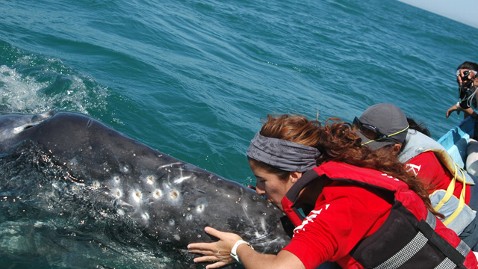Gray Whales, Protected Off Mexico, May Face New Threat in Arctic
By ABC's Cecilia Vega and Alex Waterfield
Gray whales are starting to make a strong comeback in the Pacific thanks, in part, to Mexico's aggressive eco-tourism program, where whale-watching is regulated, but a new threat is emerging some 10,000 miles away.
Hunters once pushed these gentle giants to the brink of extinction - at one point, there were only 500 gray whales left. Now there are an estimated 20,000 of them and they are the first marine mammal to be removed from the endangered species list. Baja, Mexico, researchers monitor the whales' movements and growth, and even use crossbows to gather small samples of flesh to test how healthy they are.
But while the gray whales may be protected in the Baja lagoons where they mate and raise their young, environmentalists are concerned about a looming danger to the animals' feeding grounds in the Arctic, where Shell Oil is scheduled to begin exploratory drilling this summer.
"Shell's oil and gas leases exactly overlap with the critical feeding area of the gray whale," World Wildlife Fund spokeswoman Leigh Henry said.
The process of looking for oil means sending sonic booms, or shock waves, into the sea floor, and environmentalists worry the noise might affect the whales' survival. These animals make deep sounds to do almost everything - navigate, find food, find mates - and the deafening booms could make the whales become disoriented and mothers could even be separated from their calves, Henry said.
"Essentially when you have all this noise muting and masking their ability to hear, they can't do any of those things," she said. "It's like them trying to go about their daily lives with a bucket on their head."

A researcher kisses a gray whale off the coast of Mexico. Credit: Tabata Olavarietta
Shell declined " Nightline's" request for an interview, but said in a statement that their data shows whales are "generally undisturbed by industry activity." The company pointed to another whale species, the bowhead, whose population has grown despite drilling in their feeding grounds.
"We would not consider working in the Alaska offshore if we were not confident in our ability to do so without negatively impacting … marine mammals," Shell said in the statement.
But it's not just the noise Henry is worried about. She said Shell is not prepared if a massive oil spill were to happen, and pointed to the BP oil spill disaster in the Gulf of Mexico last year.
"It's a little unreasonable to think that we're going to be prepared to clean up an oil spill in the Arctic," she said. "Obviously, Shell has insurmountable resources to do this work and we would like them to step up and take responsibility and ensure that any operations they undertake in the Arctic have minimal impact on the whales."
Shell argues that it has taken responsibility, engineering a containment system like the one that was ultimately successful in stopping the Deepwater Horizon blowout in the Gulf of Mexico. The company added that it has also "assembled an … oil spill response fleet that is second to none in the world."
Environmentalists remain skeptical, and they hope to generate enough public support to delay or even halt the drilling, but the Obama administration has already approved it.
"What are we going to do after we drill in the Arctic?" Henry said. "It's a short-term solution to a long-term problem and we need to be looking at alternative fuel sources."